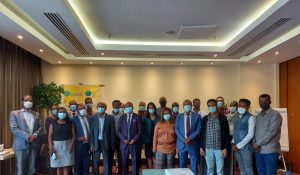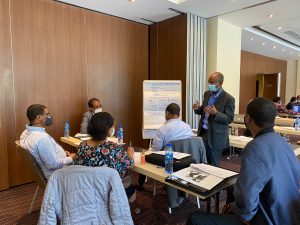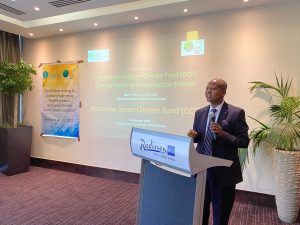
Addis Ababa, Ethiopia, February 24-25, 2021 – GCF Readiness and preparatory project/GGGI Ethiopia hosted a workshop for the Private sectors of Ethiopia in their pursuit to access Green Climate Fund’s (GCF) investments. Participants of the workshop were from the private sector, government institution representatives, the National Designated Authority (NDA), and the GGGI Ethiopia country team.
This workshop is a follow-up of a previous private sector engagement workshop organized by the GCF readiness support program. In December 2020, an awareness creation and consultation workshop with a theme “Enabling Effective Private Sector Engagement in Climate-Resilient and Green Economy and Climate Finance Opportunities” was undertaken. The workshop gathered high level leaders of Ethiopia’s Chamber of Commerce and Sectorial Association, Ethiopia business executives from priority sectors as well as participants from the financial sector. The workshop enhanced the understanding of the participants on the Private Sector Facility (PSF) of GCF. Furthermore, the GCF accreditation and approval processes, gender, environmental, and social safeguard frameworks were thoroughly discussed. The workshop familiarized the private actors and the financial institutions with climate mitigation and adaptation programs of the GCF. Specifically, Marathon motors, business sectors such as forest coffee producing unions, a green manufacturing enterprise and association working in the livestock sector have reflected their strong commitment to actively involve in climate programs and contribute their part to the global efforts of mitigating and adapting to climate change impacts. Likewise, the Development Bank of Ethiopia has shown interest to apply for GCF direct accreditation access.
As a follow-up of this private sector awareness-raising workshop, a coordination meeting to facilitate GCF Concept Notes by Private Sector Entities was organized by GGGI Ethiopia. The coordination meeting introduced modalities for GCF concept note writing and templates to the representatives of private sector entities. The coordination meeting was officially opened by the GGGI Ethiopia country representative, Dr. Gemedo Dalle. Dr. Dalle underlined the importance of engaging the private sector in green growth and climate action. The meeting included presentations that provided an overview of GCF as a key source of climate finance. The coordination meeting was framed by draft project idea notes presented by private actors who showed interest to engage with GCF.
The transport sector national priorities and subsequent ten years road map was presented by Mr. Fitsum Berhan, advisor to Her Excellency Minister of Transport of Ethiopia. Mr. Samuel Mamo, senior director of Automotive, Marathon Motor Engineering PLC also made a presentation on the new stride of Marathon motors zero-emission electric vehicles assembly in Ethiopia. Meseker Mekuria, a representative of Tikur Anbessa Motors PLC, gave a presentation about the need for electric vehicles in Addis Ababa and the unsustainable fuel consumption and future price increments.
From the private actors in the agriculture sector, Dr. Taddese Woldemariam, Executive Director of Environment and Forest Coffee Forum (EFCF), gave a presentation about the Climate-resilient Coffee Value Chain and the need to diversify coffee varieties that can withstand the forecasted environmental conditions of Ethiopia. Ato Heyeru Hussien, Project Coordinator of the Greening Ethiopia Manufacturing, Ethiopian Chamber of Commerce and Sectorial Association (ECCSA), presented on Scaling-up Greening Ethiopian Manufacturing (GEM) project and how ECCSA’s coordination of the Project is helping many Micro Small and Medium Enterprises (MSMEs) to use environmentally friendly manufacturing methods. The GEM project is also reported to have created markets for some of the enterprises as well as created national and international audiences for some of the leather and textile manufacturing enterprises. Other private sector representatives also took the stage on sharing their experiences in projects building a green economy. Ato Demelash Wegayehu, one of the pioneer private actors in integrated agricultural development, shared his company’s success in creating a multi-sectoral value added integrated agricultural production that has demonstrated the possibilities for private sector engagement. His presentation addressed key challenges that need policy interventions of the government. There were also other presentations that shared experiences in different sectors showing the potential for climate mitigation and adaptation programs. Participants of the workshop were also divided into two working groups and exercised concept note development with the support and facilitation roles of the GCF readiness team.
The expected outcomes of the two complementary workshops were met as the participants enhanced their understanding of the climate finance landscape, as well as the GCF operational modalities and financial instruments. The participants further developed a clear understanding of the steps needed to prepare strong project concepts for GCF. The presentations on the project idea notes of the potential sectors facilitated discussions and an agreement on the way forward to develop quality concept notes that are aligned with the GCF requirement.

